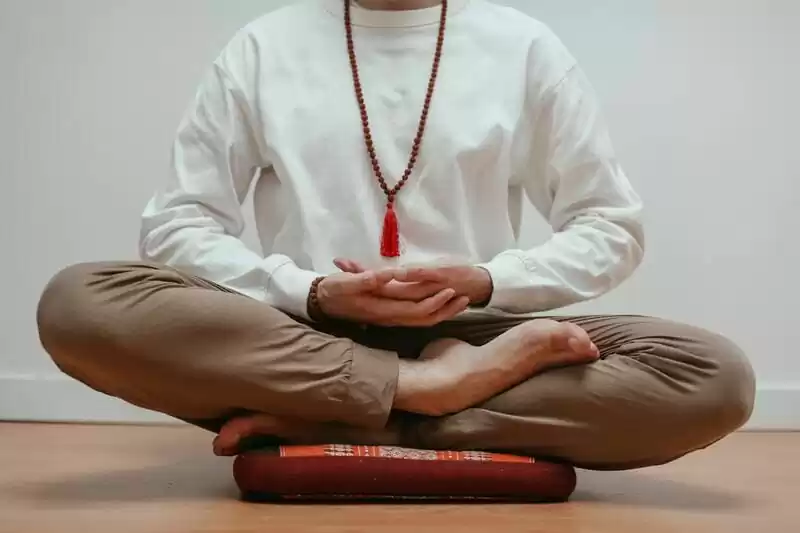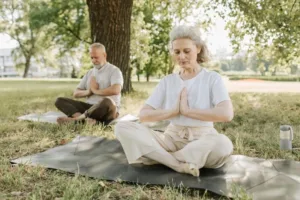7 reasons why people meditate and why you should start today
Do you also wonder why people meditate? In the words of the Dalai Lama, “We can think of meditation as a technique by which we diminish the force of old thought habits and develop new ones”. He provides a perspective that makes meditation powerful. When you think about meditation, a few words come to mind. You think of inner peace, calmness, balance, and well-being. It is a transformational practice. The benefits of meditation are many. Yet, there are a lot of questions about what it is and why people practice it.
Understanding meditation
Meditation is a range of practices that involve clearing your mind and focusing on the present using a combination of physical and mental techniques. It calms the mind and improves well-being. Some forms of meditation involve mentally focusing on a sensation, breathing, focusing on a visual image, or on a repeated word known as a mantra.
Overall, there are 4 main types of meditation, all with proven benefits. These benefits form the basis for why people meditate. We will look at a few of them in more depth in this article.
7 Proven Reasons Why People Meditate
1. Meditation helps improve concentration
One of the main benefits of meditation is that it improves concentration. Meditation trains the mind to live in the present and focus on one thing. By doing that, people can boost their mental focus. And this helps them in task completion and relaxation.
A study evaluated the impact of meditation training on cognitive functions. It concluded that practitioners improved their self-reported mindfulness, rumination, and sustained attention (Chambers et al., 2008). Meditation helps people maintain calmness and emotional balance, resulting in better concentration.
2. Meditation improves mental health

Meditation is not a silver bullet for mental health issues. Yet, regular meditation reduces stress, anxiety levels, and depression symptoms. Meditation practitioners reported improvements in their self-esteem, mental focus, and mood.
A clinical trial evaluated the effect of a 12-week meditation course on participants. The study concluded that meditation improves the mental health of young adults. Another study found that daily meditation enhanced mood, emotional regulation, and attention.
3. Meditation improves physical health
Apart from the mental health benefits, physical health is also at the top of the list of why people meditate. To give you some examples: regular meditation introduces a lifestyle change that can trigger fatigue reduction and weight loss. Many studies also show that meditation stabilizes blood circulation, regulates blood pressure and improves metabolism.
Researchers at the American Heart Association Scientific stated that meditation increases mental and physical relaxation. And that would lead to better outcomes after a cardiovascular incident. They further analyzed the data of over 61,000 participants from the National Health Interview Survey and concluded that meditation also helped reduce the prevalence of cardiovascular disease.
Research also shows that meditation reduces the effects of dementia and improves cognitive health (Russell-Williams et al., 2018).
4. Meditation improves self-awareness
Self-awareness is the ability to look inwards and assess how your thoughts, emotions, or actions align with your purpose. Practicing meditation gives you clarity of thought. As a result, you can take stock of your feelings and actions. Meditation takes you to a place of inner peace and calmness. And when you get there, you connect with your inner self.

The world is fast-paced. Work and family. Distractions from social media. Then there is technology. Life serves us an endless stream of activities. With these distractions, losing track of your true self is easy. To become more self-aware, you need to stop doing, stop thinking, and focus on yourself. Meditation helps you do this.
5. Meditation can help overcome addiction
In 2020, the United Nations reported that over 284 million people aged 15-64 struggle with drug addiction. And every year, 11.8 million people globally die from the effects of drug abuse. Drug use and addiction are soaring.
People are turning to meditation to help them recover from substance addiction. People recovering from addiction usually complain of anxiety, stress, pain, and poor sleep. These complaints often become triggers that make them go back to substance use. Research has found that meditation reduces the effect of those trigger symptoms.
Meditation also increases emotional stability and reduces post-acute withdrawal symptoms. This stabilizes recovering addicts. Studies show that mindfulness meditation helps in preventing relapse and treating addictive disorders. The benefits of meditation help manage symptoms of withdrawals, cravings, and triggers (Wani & Singh, 2019).
6. Meditation helps to reduce stress
According to a recent survey, 41% of adults reported some form of stress. It is an alarming number. Hence, it is no surprise that people turn to meditation for stress and anxiety relief. It is one of the main reasons why people meditate.
Meditation gives the body the opposite of what stress does to it. Stress leaves the body in emotional, physical, or psychological discomfort. But meditation ushers a state of peace and tranquility. In that state, you can organize your thoughts and decide what to focus on. Meditation also trains your mind and increases your mental fortitude. That way, you control your internal feelings and reduce stress.
According to Gamaiunova et al. (2019), meditation practitioners adapt to stress through acceptance and positive reappraisal. In other words, when they find themselves in challenging situations, they are able to remain calm and adapt their minds to see the positives. These adaptive emotions amplify quicker recovery from stress.
7. Meditation improves sleep

Sleep is essential for good health and well-being. And like St. Thomas Aquinas once said, “a good sleep can ease sorrow”. But, how important is sleep?
Insufficient sleep is an underlying cause of many negative social and health outcomes. In the United States, insufficient sleep accelerates 7 of the 15 major causes of death (Chattu et al., 2019).
Yet, 44% of people report worsening sleep quality, and 37% struggle with insomnia. Many adults are at risk of the adverse effects of poor sleep quality. Meditation improves sleep. It triggers the body to ramp up natural melatonin production. Melatonin is the hormone that regulates the sleep-wake cycle. The more your body produces it, the better you can sleep.
Overall, meditating before sleep also helps. Researchers conducted a mixed-method study conducted during the COVID-19 pandemic. The result supports the efficacy of meditation for better sleep (Desai et al., 2021). Several other studies also conclude that meditation promotes better sleep (Kanchibhotla et al., 2021; Amarnath et al., 2017).
Conclusion
You asked the question. Now you have the answer. Generally, people practice meditation for mindfulness, emotional balance, inner peace, better sleep, and well-being. The list of benefits is endless and backed by research. And the best part? It is accessible, easy to start, and anyone can practice it.
Samavira Community Survey
We ran a survey amongst the students of our Samavira Meditation Training, to learn more about the reasons why they meditate, and hence the reasons why they signed up for our training!
50% of our students started their meditation practice to reduce stress and increase self-awareness. In addition, almost 40% of our students use meditation to let go of negative emotions, reduce overthinking, and reduce overwhelm. Others meditate because they want to feel more grateful, be more focused, and receive more inspirational ideas and insights!
As you can see – for us, meditation is more than just a stress-reducing tool. What is your main reason to start your practice? 🙂
Your next step
Want to start your meditation journey after reading about all these powerful benefits?
Join our free live-guided wellness sessions!
Enjoyed this article? Share it!
Keep reading!

Sleep Better, Live Better: Meditation for Insomnia Relief
Insomnia affects millions of people worldwide, leading to various health issues such as fatigue, irritability, and a weakened immune system. One effective method to combat

Clarity Amidst Chaos: How to Use Meditation for Concentration and Focus
Let’s talk about why meditation for concentration and focus is important. Focus is a crucial aspect of daily life that allows individuals to concentrate their

Meditation for Emotional Resilience: A How-to Guide
Meditation is a powerful tool that can help build emotional resilience. In our daily lives, we encounter various stressors and challenges that can impact our

Using Meditation to Cope with Flashbacks and Emotional Triggers
Experiencing flashbacks and emotional triggers can be an overwhelming challenge, often leading individuals to seek various coping strategies. Among these, meditation has emerged as a

Meditation for Seniors: Practical Tips for Healthy Aging & Wellbeing
You may be wondering, why meditation for seniors? The truth is, no one is too old or too young to meditate. Meditation is for everyone,

How To Become A Meditation Teacher: 9 Practical Steps To A Blissful Career
Being a meditation teacher is a beautiful path to personal growth, career satisfaction, and creating a positive impact in your community. If you have ever

